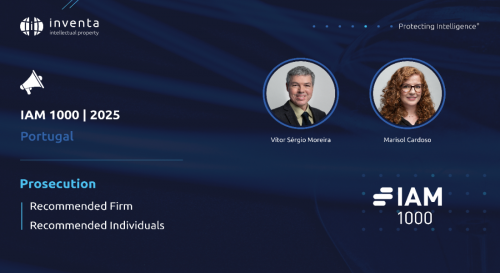
Patent rights: Advantages of the cooperation between Portugal and Cape Verde
A protocol on Patent matters has recently been celebrated between the National Institute of Industrial Property (INPI) of Portugal and the Institute of Quality and Intellectual Property Management (IGQPI) of Cape Verde, aiming to improve the services provided by the latter.
Up to date, in what concerns the protection of Industrial Property rights in Cape Verde, an overwhelming predominance on Trademark matters has been verified. Such fact can be explained by the circumstance the IGQPI’s technicians have a higher formation on Trademarks rather than on Patents area.
Hence, as a result of the very limited experience on Patent matters in the country, the Cape Verdean technicians did not develop a methodology for the substantial examination of Patents, that required the verification of the patentability requirements (novelty, inventive step, industrial applicability) as well as the verification of all the elements of the process, situation that led to a great deadlock in the registration process of these Industrial Property rights.
The steps until registration consist on the following:
- Filing of the Patent application;
- Formal examination;
- Publication in the Industrial Property Bulletin (IPB);
- Opposition period;
- Substantial examination;
- Notice of grant.
As a result of the above-mentioned factors, the Patent's registration process was, inevitably, locked in the phase of the publication of the application in the IPB, and neither the substantial examination nor the notice of grant were observed.
Motivated by the lack of developments in the registration process of their Patent applications, the applicants, that have invested in the protection of their inventions in this jurisdiction, started to lose faith in the Cape Verdean Institute, situation that led to an informal abandonment of some Patent applications in the country.
In May 2019 (IPB published on May 13, 2019), the number of Patent applications in Cape Verde merely corresponded to 16, while, on the other hand, the number of Trademark applications ascended to 4.114.
It should be underlined that the very fact of not existing developments on Patent matters is a key factor for the lack of investment on the applicants’ behalf, which results in an extremely low number of Patent applications in the archipelago.
In this juncture, and further to the IGQPI acknowledgement of the enormous underrated potential of his patent rights, a protocol of technical assistance between INPI and IGQPI was celebrated. In this protocol, the Portuguese Patent technicians started to support the Cape Verdean staff in the technical opinions for the purpose of the substantial examination of Patent applications.
Even though this collaboration is very recent, we believe that, in due course, we will have, for the very first time, Patents granted in the country, situation that might contradict the current trend of the applicant’s low economic investment in the country, increasing their trustworthiness in the service and diligence of the IGQPI.
This collaboration will firstly be focusing new patent applications, the tendency will be to substantially examine the older applications, that await developments for years.
The collaboration between Institutes reveals to be, in this sense, crucial to help fill gaps and to add value to the PTO’s.
The higher the training of the PTO’s technical staff, the greater it will be their ability to respond, and the faster the issuance of notices of grant of new applications of the various modalities of Industrial Property. The cooperation scenario we have learnt above, between the Portuguese and Cape Verdean Offices, are precisely an instance of that.
Territory List
There are no results for your search.
- Africa
- Algeria
- Angola
- Benin
- Botswana
- Burkina Faso
- Burundi
- Cameroon
- Cape Verde
- Central African Republic
- Chad
- Comoros
- Congo (Republic)
- Côte d'Ivoire
- Democratic Republic of the Congo
- Djibouti
- Egypt
- Equatorial Guinea
- Eritrea
- Eswatini (Swaziland)
- Ethiopia
- Gabon
- Gambia
- Ghana
- Guinea
- Guinea-Bissau
- Kenya
- Lesotho
- Liberia
- Libya
- Madagascar
- Malawi
- Mali
- Mauritania
- Mauritius
- Mayotte
- Morocco
- Mozambique
- Namibia
- Niger
- Nigeria
- Réunion
- Rwanda
- Sao Tome and Principe
- Senegal
- Seychelles
- Sierra Leone
- Somalia
- South Africa
- South Sudan
- Sudan
- Tanzania (mainland)
- Togo
- Tunisia
- Uganda
- Western Sahara
- Zambia
- Zanzibar
- Zimbabwe
- Africa (OAPI)
- Africa (ARIPO)
- Other
- East Timor
- Macao
- Maldives
- Portugal
- European Patent (EPO)
- European Union Trademark (EUTM)
- International Trademark (Madrid System)
- Patent Cooperation Treaty (PCT)




